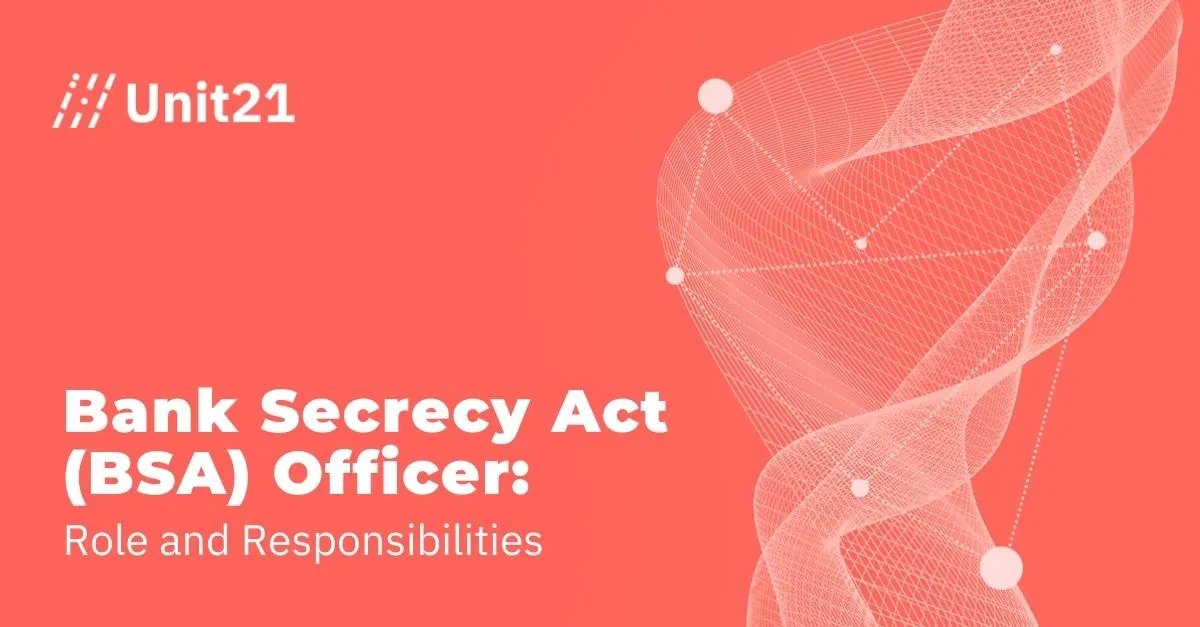

A Bank Secrecy Act (BSA) Officer works inside of a financial institution and ensures that the institution complies with laws related to the Bank Secrecy Act. Their role is crucial to a bank’s legal and regulatory standings and requires knowledge of both the law and more specific bank policies, so the selection of a BSA officer should be made thoughtfully.
What Does a BSA Officer Do?
BSA Officers manage all aspects of their institution’s BSA compliance program. They work to create, deploy, and organize AML systems and controls. In the event of suspicious activity or financial crimes, they must report to state and federal authorities.
Some of the BSA Officer’s responsibilities include:
- Overseeing and running visits from independent state and federal auditors.
- Organizing and deploying responses to audits.
- Having current knowledge about the changing AML compliance climate, including the regulations in the OFAC, BSA, as well as the USA Patriot Act.
- Helping internal business units with risk assessments of money laundering-related activities.
- Monitoring and tracking high-risk accounts and customers as well as keeping records of them.
- Filing Suspicious Activity Reports (SARs) to authorities if suspicious activity (such as cash purchases of negotiable instruments, or transactions of over $10,000) is detected.
- Informing and making recommendations to senior management about BSA-AML policies.
A BSA officer should also help coordinate collaboration between risk and product teams, optimizing the product development process.
Who Should Be a BSA Officer?
When selecting a BSA Officer it is important to take these factors into account:
Time and Resources
Ensure that your financial institution’s BSA Officer is given the resources and time that they need to do their job effectively. When hiring, you should also take potential conflicts of interest into account. Smaller institutions may not need to hire a full-time BSA Officer, however, it is very likely that larger institutions will have to hire someone full-time in order to keep up with the greater administrative load.
Authority and Independence
BSA officers need to hold enough authority to do their job effectively. It is recommended that a BSA Officer is a director-level employee, and crucial that they have the confidence to do their job in a professional environment.
Knowledge and Understanding
It is crucial that BSA Officers have an extensive understanding of their institution’s AML regulations, not just of the Bank Secrecy Act. BSA officers should also have continuous BSA-AML compliance training to maintain their level of knowledge.
Institutional Support
Senior managements' participation is one of the most important aspects of hiring a BSA officer since the position represents a company’s commitment to combat financial crime.
Members of the board should be capable of offering BSA officers extensive support and should work with them to make an environment where AML compliance is not seen as a regulatory burden but a professional goal.
If you are interested in learning more about how Unit21 can assist your BSA officer, schedule a meeting today.
Subscribe to our Blog!
Please fill out the form below:
Learn more about Unit21
Unit21 is the leader in AI-powered fraud and AML, trusted by 200 customers across 90 countries, including Green Dot, Chime, and Sallie Mae. One unified platform brings detection, investigation, and decisioning together with intelligent automation, centralizing signals, eliminating busy work, and enabling faster responses to real risk.





